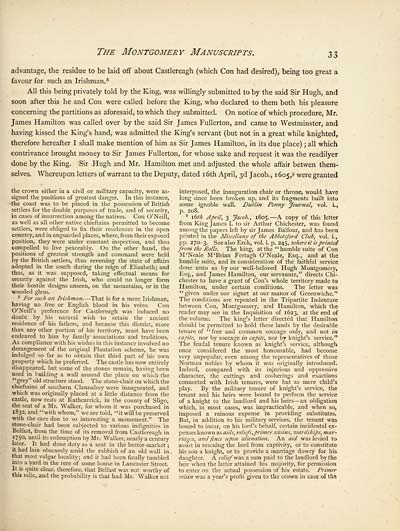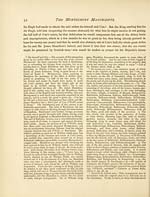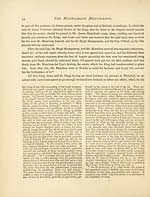Montgomery manuscripts
(47) Page 33
Download files
Complete book:
Individual page:
Thumbnail gallery: Grid view | List view

The Montgomery Manuscripts.
33
advantage, the residue to be laid off about Castlereagh (which Con had desired), being too great a
favour for such an Irishman. 8
All this being privately told by the King, was willingly submitted to by the said Sir Hugh, and
soon after this he and Con were called before the King, who declared to them both his pleasure
concerning the partitions as aforesaid, to which they submitted. On notice of which procedure, Mr.
James Hamilton was called over by the said Sir James Fullerton, and came to Westminster, and
having kissed the King's hand, was admitted the King's servant (but not in a great while knighted,
therefore hereafter I shall make mention of him as Sir James Hamilton, in its due place) ; all which
contrivance brought money to Sir James Fullerton, for whose sake and request it was the readilyer
done by the King. Sir Hugh and Mr. Hamilton met and adjusted the whole affair betwen them-
selves. Whereupon letters of warrant to the Deputy, dated 1 6th April, 3d Jacob., 1 605,9 were granted
the crown either in a civil or military capacity, were as-
signed the positions of greatest danger. In this instance,
the coast was to be placed in the possession of British
settlers for the double purposes of trade, and of security,
in cases of insurrection among the natives. Con O'Neill,
as well as all other native chieftains permitted to become
settlers, were obliged to fix their residences in the open
country, and in unguarded places, where, from their exposed
position, they were under constant inspection, and thus
compelled to live peaceably. On the other hand, the
positions of greatest strength and command were held
by the British settlers, thus reversing the state of affairs
adopted in the south during the reign of Elizabeth; and
thus, as it was supposed, taking effectual means for
security against the Irish, who could no longer form
their hostile designs unseen, on the mountains, or in the
wooded glens.
8 For such art Irishman. — That is for a mere Irishman,
having no free or English blood in his veins. Con
O'Neill's preference for Castlereagh was induced no
doubt by his natural wish to retain the ancient
residence of his fathers, and because this district, more
than any other portion of his territory, must have been
endeared to him by family associations and traditions.
As compliance with his wishes in this instance involved no
derangement of the original Plantation scheme, he was
indulged so far as to obtain that third part of his own
property which he preferred. The castle has now entirely
disappeared, but some of the stones remain, having been
used in building a wall around the place on which the
"grey" old structure stood. The stone-chair on which the
chieftains of southern Clannaboy were inaugurated, and
winch was originally placed at a little distance from the
castle, now rests at Rathcarrick, in the county of Sligo,
the seat of a Mr. Walker, for whom it was purchased in
1832, and "with whom," we are told, "it will be preserved
with the care due to so interesting a monument." The
stone-chair had been subjected to various indignities in
Belfast, from the time of its removal from Castlereagh in
1750, until its redemption by Mr. Walker, nearly a century
later. It had done duty as a seat in the butter-market ;
it had lain obscurely amid the rubbish of an old wall in
that most vulgar locality; and it had been finally tumbled
into a yard in the rere of some house in Lancaster Street.
It is quite clear, therefore, that Belfast was not worthy of
this relic, and the probability is that had Mr. Walker not
interposed, the inauguration chair or throne, would have
long since been broken up, and its fragments built into
some ignoble wall. Dublin Penny Journal, vol. i.,
p. 208.
9 ibth April, 3 Jacob., 1605. — A copy of this letter
from King James I. to sir Arthur Chichester, was found
among the papers left by sir James Balfour, and has been
printed in the Miscellany of the Abbotsford Club, vol. i.,
pp. 270-3. See also Erck, vol. i. p. 245, where it is printed
from the Rolls. The king, at the "humble suite of Con
M'Neale M 'Brian Fertagh O'Neale, Esq., and at the
humble suite, and in consideration of the faithful service
done unto us by our well-beloved Hugh Montgomery,
Esq,, and James Hamilton, our servaunte," directs Chi-
chester to have a grant of Con's whole territory made to
Hamilton, under certain conditions. The letter was
"given under our signet at our manor of Greenwiche. "
The conditions are repeated in the Tripartite Indenture
between Con, Montgomery, and Hamilton, which the
reader may see in the Inquisition of 1623, at the end of
the volume. The king's letter directed that Hamilton
should be permitted to hold these lands by the desirable
tenure of " free and common soccage only, and not in
capite, nor by soccage in capite, nor by knight's service."
The feudal tenure known as knight's service, although
once considered the most honourable, had become
very unpopular, even among the representatives of those
Norman nobles by whom it was originally introduced.
Indeed, compared with its injurious and oppressive
character, the cuttings and cosherings and exactions
connected with Irish tenures, were but as mere child's
play. By the military tenure of knight's service, the
tenant and his heirs were bound to perform the service
of a knight to the landlord and his heirs— an obligation
which, in most cases, was impracticable, and when so,
imposed a ruinous expense in providing substitutes.
But, in addition to his military services, the tenant was
bound to incur, on his lord's behalf, certain incidental ex-
penses known as aids, reliefs, primer seisins, wardships, mar-
riages, and fines upon alienation. An aid was levied to
assist in rescuing the lord from captivity, or to constitute
his son a knight, or to provide a marriage dowry for his
daughter. A relief was a sum paid to the landlord by the
heir when the latter attained his majority, for permission
to enter on the actual possession of his estate. Primer
seisin was a year's profit given to the crown in case of the
33
advantage, the residue to be laid off about Castlereagh (which Con had desired), being too great a
favour for such an Irishman. 8
All this being privately told by the King, was willingly submitted to by the said Sir Hugh, and
soon after this he and Con were called before the King, who declared to them both his pleasure
concerning the partitions as aforesaid, to which they submitted. On notice of which procedure, Mr.
James Hamilton was called over by the said Sir James Fullerton, and came to Westminster, and
having kissed the King's hand, was admitted the King's servant (but not in a great while knighted,
therefore hereafter I shall make mention of him as Sir James Hamilton, in its due place) ; all which
contrivance brought money to Sir James Fullerton, for whose sake and request it was the readilyer
done by the King. Sir Hugh and Mr. Hamilton met and adjusted the whole affair betwen them-
selves. Whereupon letters of warrant to the Deputy, dated 1 6th April, 3d Jacob., 1 605,9 were granted
the crown either in a civil or military capacity, were as-
signed the positions of greatest danger. In this instance,
the coast was to be placed in the possession of British
settlers for the double purposes of trade, and of security,
in cases of insurrection among the natives. Con O'Neill,
as well as all other native chieftains permitted to become
settlers, were obliged to fix their residences in the open
country, and in unguarded places, where, from their exposed
position, they were under constant inspection, and thus
compelled to live peaceably. On the other hand, the
positions of greatest strength and command were held
by the British settlers, thus reversing the state of affairs
adopted in the south during the reign of Elizabeth; and
thus, as it was supposed, taking effectual means for
security against the Irish, who could no longer form
their hostile designs unseen, on the mountains, or in the
wooded glens.
8 For such art Irishman. — That is for a mere Irishman,
having no free or English blood in his veins. Con
O'Neill's preference for Castlereagh was induced no
doubt by his natural wish to retain the ancient
residence of his fathers, and because this district, more
than any other portion of his territory, must have been
endeared to him by family associations and traditions.
As compliance with his wishes in this instance involved no
derangement of the original Plantation scheme, he was
indulged so far as to obtain that third part of his own
property which he preferred. The castle has now entirely
disappeared, but some of the stones remain, having been
used in building a wall around the place on which the
"grey" old structure stood. The stone-chair on which the
chieftains of southern Clannaboy were inaugurated, and
winch was originally placed at a little distance from the
castle, now rests at Rathcarrick, in the county of Sligo,
the seat of a Mr. Walker, for whom it was purchased in
1832, and "with whom," we are told, "it will be preserved
with the care due to so interesting a monument." The
stone-chair had been subjected to various indignities in
Belfast, from the time of its removal from Castlereagh in
1750, until its redemption by Mr. Walker, nearly a century
later. It had done duty as a seat in the butter-market ;
it had lain obscurely amid the rubbish of an old wall in
that most vulgar locality; and it had been finally tumbled
into a yard in the rere of some house in Lancaster Street.
It is quite clear, therefore, that Belfast was not worthy of
this relic, and the probability is that had Mr. Walker not
interposed, the inauguration chair or throne, would have
long since been broken up, and its fragments built into
some ignoble wall. Dublin Penny Journal, vol. i.,
p. 208.
9 ibth April, 3 Jacob., 1605. — A copy of this letter
from King James I. to sir Arthur Chichester, was found
among the papers left by sir James Balfour, and has been
printed in the Miscellany of the Abbotsford Club, vol. i.,
pp. 270-3. See also Erck, vol. i. p. 245, where it is printed
from the Rolls. The king, at the "humble suite of Con
M'Neale M 'Brian Fertagh O'Neale, Esq., and at the
humble suite, and in consideration of the faithful service
done unto us by our well-beloved Hugh Montgomery,
Esq,, and James Hamilton, our servaunte," directs Chi-
chester to have a grant of Con's whole territory made to
Hamilton, under certain conditions. The letter was
"given under our signet at our manor of Greenwiche. "
The conditions are repeated in the Tripartite Indenture
between Con, Montgomery, and Hamilton, which the
reader may see in the Inquisition of 1623, at the end of
the volume. The king's letter directed that Hamilton
should be permitted to hold these lands by the desirable
tenure of " free and common soccage only, and not in
capite, nor by soccage in capite, nor by knight's service."
The feudal tenure known as knight's service, although
once considered the most honourable, had become
very unpopular, even among the representatives of those
Norman nobles by whom it was originally introduced.
Indeed, compared with its injurious and oppressive
character, the cuttings and cosherings and exactions
connected with Irish tenures, were but as mere child's
play. By the military tenure of knight's service, the
tenant and his heirs were bound to perform the service
of a knight to the landlord and his heirs— an obligation
which, in most cases, was impracticable, and when so,
imposed a ruinous expense in providing substitutes.
But, in addition to his military services, the tenant was
bound to incur, on his lord's behalf, certain incidental ex-
penses known as aids, reliefs, primer seisins, wardships, mar-
riages, and fines upon alienation. An aid was levied to
assist in rescuing the lord from captivity, or to constitute
his son a knight, or to provide a marriage dowry for his
daughter. A relief was a sum paid to the landlord by the
heir when the latter attained his majority, for permission
to enter on the actual possession of his estate. Primer
seisin was a year's profit given to the crown in case of the
Set display mode to:
![]() Universal Viewer |
Universal Viewer | ![]() Mirador |
Large image | Transcription
Mirador |
Large image | Transcription
Images and transcriptions on this page, including medium image downloads, may be used under the Creative Commons Attribution 4.0 International Licence unless otherwise stated. ![]()
| Histories of Scottish families > Montgomery manuscripts > (47) Page 33 |
|---|
| Permanent URL | https://digital.nls.uk/95233491 |
|---|
| Description | A selection of almost 400 printed items relating to the history of Scottish families, mostly dating from the 19th and early 20th centuries. Includes memoirs, genealogies and clan histories, with a few produced by emigrant families. The earliest family history goes back to AD 916. |
|---|

